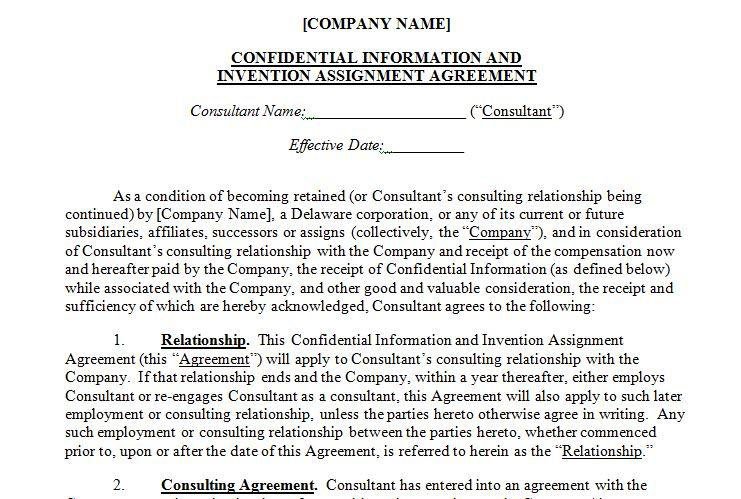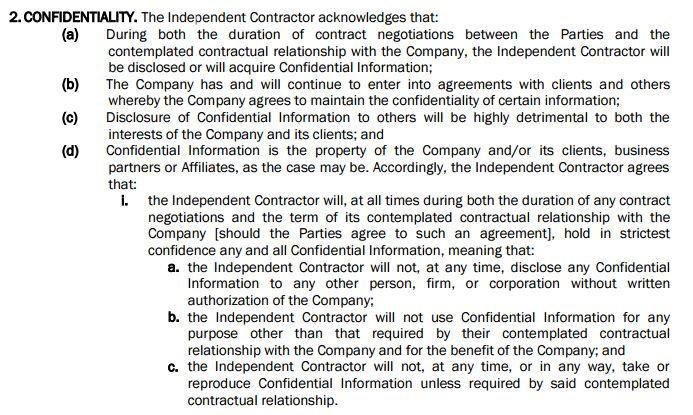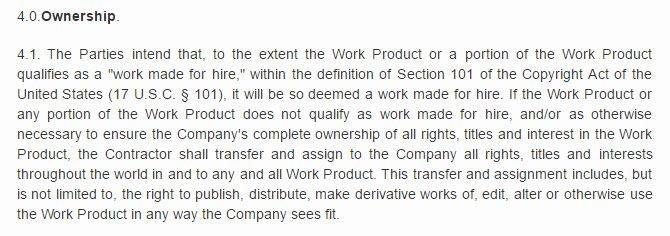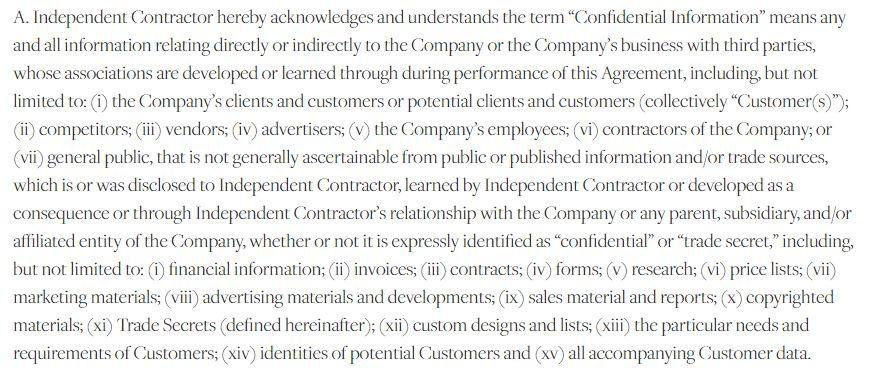Before the NDA, own the IP rights

Non-disclosure agreements (NDA) have become almost synonymous with the protection of trade secrets, confidential information, valuable data and proprietary rights.
Mention to another entrepreneur that you have a top secret design or software that you have just created and inevitably, the conversation turns to NDAs.
These agreements are undeniably useful for protecting confidential information, especially trade secrets, as NDAs don’t have to be registered in a public register like patents.
They are basically a contract between parties where a party that receives confidential information (“Receiving Party”) promises to only use the information received for authorized purposes and not to use or disclose the information to anyone else without the permission of the party disclosing the confidential information (“Disclosing Party”).
However, have you ever considered whether you own the intellectual property rights to your confidential information in the first place?
First of all, how do intellectual property rights work and how do you acquire them?
Contents
Intellectual Property Rights (IP rights)
Intellectual property rights (IP rights) refer to rights that are given to a person who creates something tangible from his or her own intellect or mind. Although the idea itself may be non-tangible, the intellectual property itself has to be in a physical form such as a song, article or software. IP rights include copyrights, patents, trademarks, designs and trade secrets.
Copyrights
Copyrights automatically exist for original works of a literary, creative, intellectual, musical and artistic nature such as publications, web content and video recordings.
Copyright works may be protected through international agreements such as the Berne Convention.
However, copyrights don’t last forever. In most countries, they normally last for a minimum of the lifetime of the creator plus approximately 50 years after, depending on the type of work.
Patents
Patents refer to an invention that is made or used as a new solution to a problem and unlike copyrights, it needs to be registered formally and disclosed to the public.
Once approved, the owner of the patent is automatically granted exclusive rights to the patent and others are prohibited from using, making or selling the patent. Patents last a lot shorter than copyrights and depending on the type of patent and where it is registered, patents can last for approximately 20 years.
Patents only apply in the country in which the patent is registered.
Trademarks
Trademarks normally apply to branding protection and can apply to symbols, sounds, signs and designs for a particular type of trader, product or service.
Trademarks must be unique and once registered, you will possess exclusive use of your trademark.
However, even if you haven’t registered your trademark, there are certain circumstances where you can claim exclusive use of the trademark. For example, where you have already built up goodwill in relation to the trademark and customers have started associating the trademark with your products and services.
Designs
Design IP rights normally refer to two or three dimension visual designs that could include configurations, colors, patterns and shapes, but not functionality of the design (if the design is about how a certain product works, then this would need to be registered as a patent).
You have the option of choosing whether to officially register your design and by choosing to do so, you can license, mortgage and sell your design rights.
Trade Secrets
Trade secrets are a special type of confidential information that has to meet certain specific requirements such as possessing inherent commercial value, conferring economic benefit to its owner and the owner must take reasonable measures to protect the trade secret.
Trade secrets are never registered in a public forum as to do so would destroy the very essence of its existence, that is, it would no longer qualify as a trade secret once published.
Apart from being the creator and therefore automatic owner of most of the above IP rights, you can also own IP rights by buying or acquiring the intellectual property directly from the creator or present owner.
In other words, you don’t have to be the creator to own IP rights. However, patents and certain types of design need to be officially registered before you can claim ownership and protection of your IP right.
Employees & IP Rights
If you have a policy of hiring great employees, it won’t be surprising if you have at least one employee that takes his or her initiative to create something new that gives rise to IP rights.
Without a clear written arrangement regarding those IP rights, it can be contentious whether the IP rights to the new innovation or object belongs to the employee or belongs to you as the employer.
In the US, there are federal and state laws that deal with such situations. Although there might be slight variations across the states, generally, if you have not hired the employee with a specific role to create new innovations, designs and new objects, then the employee would retain ownership of the IP rights.
However, if you have hired the employee specifically to create innovations, designs or objects to solve a particular problem, then you would retain the IP rights to any solution related to the creation or problem solved.
Federal law also provides for “work for hire” situations where the employer retains IP rights when the employee’s invention was created within the scope of employment.
In addition, even if the above did not apply in your situation, if the employee used your tools and resources in order to come up with the innovation or solution, then you could claim “shop right” to the work as the employee would not have been able to come up with the invention without access to your resources.
Even if he or she did it within his or her own free time, “shop right” generally still applies if he or she used your resources to any significant extent. However, a “shop right” does not mean ownership of the IP right but a non-exclusive, free license for you as the employer to use the invention for your business.
Since it is non-exclusive, the employee can still use, sell or license the invention out to others.
Beware that in California, Section 2870(a) of the Labor Code states that if the employee develops the invention entirely on their own time without using any of your company’s resources, then the employee retains IP rights to their invention.
Independent Contractors & IP Rights
Independent contractors, unlike employees, are generally only hired for a specific period of time for a specific project and there’s no ongoing permanent obligation of employment.
It’s not uncommon for employers to hire especially talented independent contractors to create new innovations, software or other objects with intellectual property value.
If you are intending to hire an independent contractor and you don’t have a formal agreement in place, you should consider using an Independent Contractor Agreement with specific terms including the transfer of any IP rights to you and the obligation of non-disclosure of information.
Alternatively, you should supplement your Independent Contractor Agreement with a Non-Disclosure Agreement and an Invention Assignment Agreement, also known as a Proprietary Rights Agreement.
Here is an example of an Invention Assignment Agreement for Consultants taken from Orrick, Herrington & Sutcliffe’s website:

Whether you choose to draft one single agreement that contains all the necessary clauses or whether you choose to use several different agreements to accomplish your purpose, below are the following elements that you should have in order to affirm your ownership over any IP rights:
Non-Disclosure
If you’re expecting to share confidential information with the independent contractor or you have hired him or her to create something that will have intellectual property value, then you should include non-disclosure obligations in your agreement.
This is especially so if you intend to formally register the IP right later on (such as a patent).
For example, if you were hiring the independent contractor to develop a specialized software design for you, the non-disclosure clauses could require your independent contractor to keep the project secret and not to misuse the design without your permission.
Here’s an example of a confidentiality provision in an Independent Contractor Confidentiality and Non-Disclosure Agreement by ABWCCI:

Work For Hire
A ‘work for hire’ clause basically transfers any IP rights that arise as a result of the work performed by the independent contractor to you as the employer.
You can also require that the independent contractor has an obligation to help you perfect the transfer of those rights and to the extent that any results are not considered ‘works for hire’, the results and associated IP rights will be transferred and assigned to you.
On top of this, you can also require that the contractor has an obligation to indemnify you against any third party claims of IP rights against you for infringement.
Here’s an example of a clause from Docracy:

Don’t own Intellectual Property rights?
Now that we have discussed the various ways that you can acquire IP rights, what if you are in the midst of negotiating a non-disclosure agreement (NDA) with a third party but you’re not certain whether you own the IP rights to the confidential information?
Should you still carry on with a NDA?
The answer to this question is actually not straightforward.
This is mostly because of two reasons:
-
The determination of ownership of IP rights can be complicated and there may not be certainty without a clear statement of transfer of IP rights from the creator or owner to you.
This confusion can also occur where the intellectual property needs to be registered formally (such as a patent where the process can take years) before it is formally recognized as a protectable IP right.
- Secondly, your NDA would also depend on the definition of confidential information that you use in your NDA. If you use a definition of confidential information that only covers proprietary and intellectual property information, then arguably if you don’t yet actually own the confidential information in question, the NDA may not be valid.
However, if you use a definition of confidential information that includes not just proprietary and intellectual property information but also other types of business information that is valuable to your company, arguably, the NDA would stand as it protects both proprietary and non-proprietary information.
For example, here are some clauses that have a wider scope of definition of confidential information beyond proprietary information.
Coca Cola’s Agreement on Confidentiality, Non-Competition and Non Solicitation:

Definition in an Independent Contractor Agreement for Minneapolis contractors and businesses from JUX Law Firm:

Accuride Corp’s Confidentiality and Non-Disclosure Agreement:

Therefore, I suggest that to cover your bases, you should carry on with the NDA but use a wider definition of confidential information to cover both proprietary and non-proprietary information.
What if you know for a fact that you don’t officially own the IP rights? Will the non-disclosure provisions still stand?
Probably not BUT only in relation to the proprietary and intellectual property information itself. You can’t insist on protection over intellectual property information that you don’t actually own.
However, arguably, the NDA’s confidentiality protections should still apply if you insist on confidentiality for not just proprietary but also non-proprietary information that’s valuable to your business.
If you have not yet shared intellectual property information with the Disclosing Party, arguably you can take steps to complete acquisition or transfer of the IP rights so that once ownership is established, the non-disclosure provisions can be applied accordingly.
Even better, get the agreement resigned once you have established ownership so that there is no doubt lingering over the protection of your IP rights.
In the unfortunate event that you have already shared intellectual property information with the Disclosing Party but have yet to establish ownership of the IP rights, you can only hope and trust that the Disclosing Party that you have chosen to work with has integrity and will uphold professionalism in keeping your intellectual property information secret, whether the non-disclosure clauses of your agreement are still valid or not.
In any case, you should probably work on establishing ownership of the IP rights before you proceed to share more intellectual property information with the Disclosing Party.
Jan 30, 2017 | Non-disclosure Agreements
This article is not a substitute for professional legal advice. This article does not create an attorney-client relationship, nor is it a solicitation to offer legal advice.